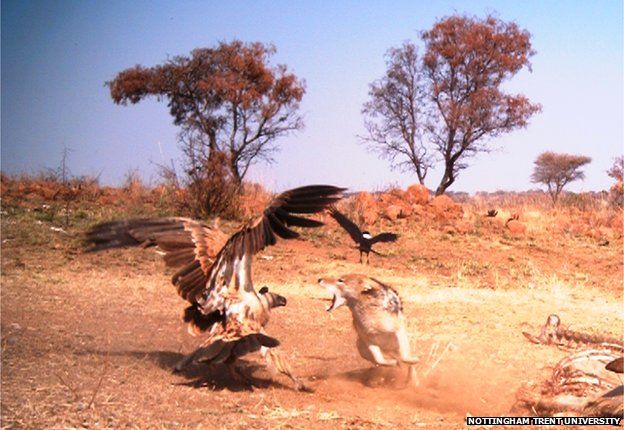Hyenas, jackals feast at vulture restaurants
- Published

"Restaurants" of dead meat set up for endangered vultures also attract an undesirable clientele of hyenas and jackals, according to a six-year study.
The research consisted of repeated "scat surveys" (dung counts) at two nearby sites in South Africa.
There was a surge in numbers of both the cheeky mammals, specifically at the site with extra food, which went back down again when the restaurants closed.
The scientists have recommended a new strategy to help boost vulture numbers.
The birds have been in decline worldwide for a number of reasons.
Specifically, the researchers suggest using fences to exclude the unwanted, earthbound customers, and dishing up the extra meat for the vultures in random locations instead of re-stocking a regular carrion pantry.
That would imitate a "naturally-occurring food source", according to Dr Richard Yarnell, a biodiversity researcher at Nottingham Trent University and the leader of the study.
His team warned that inadvertently boosting or rearranging the population of mammalian scavengers could have serious consequences for other species, as well as for the spread of diseases like rabies.
While hyenas are themselves "near threatened" according to the International Union for Conservation of Nature, jackals are considered a pest.
So the researchers were concerned when they found that jackal dung became six times as common after a vulture restaurant was introduced at the Mankwe Wildlife Reserve. The change in hyena dung density was an even more dramatic 54-fold increase.
Six kilometres away at Pilanesberg National Park, which does not include a vulture restaurant, fluctuations were only minor.
"We urge land managers and conservation practitioners to consider the wider impacts of introducing supplementary carrion to the local ecosystem," wrote the study authors, reporting their findings in the African Journal of Ecology.
As well as gathering scatological evidence, they snapped photos of the restaurant guests and their interactions, using remote camera traps.
Vulture numbers are in decline worldwide for various reasons, including scarcity of their carrion diet and poisoning by pesticides or veterinary drugs.
Providing a safe food source by regularly dragging dead animals - wild or domesticated - to a fixed location is a strategy that has been tried both in Africa and in Asia., where a plunge in vulture numbers led to a damaging rise in wild dogs, increasing the spread of rabies.
The birds' role in helping dispose of carcasses is a crucial one within many ecosystems.
Although some studies have shown that these measures are successful at helping vulture populations recover, little is known about how they affect the wider ecosystem.
Louis Phipps, another of the researchers from Nottingham Trent University, said: "Our study indicates that, while vulture restaurants are a potentially useful tool for conservation, the wider impacts of their use need to be investigated - particularly as unintentional local increases in the abundance of other species are likely to alter ecosystem dynamics."
Follow Jonathan on Twitter.
- Published12 September 2013
- Published31 July 2008
- Published17 December 2010